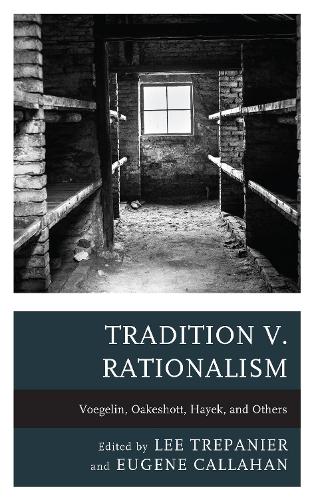
Tradition v. Rationalism: Voegelin, Oakeshott, Hayek, and Others
(Hardback)
Publishing Details
Tradition v. Rationalism: Voegelin, Oakeshott, Hayek, and Others
By (Author) Lee Trepanier
Edited by Eugene Callahan
Contributions by Grant Havers
Contributions by David Corey
Contributions by Daniel John Sportiello
Contributions by Colin Cordner
Contributions by Mark T. Mitchell
Contributions by Timothy Fuller
Contributions by Kenneth B. McIntyre
Contributions by Ferenc Hrcher
Bloomsbury Publishing PLC
Lexington Books
24th May 2018
United States
Classifications
Professional and Scholarly
Non Fiction
Social and political philosophy
320.01
Physical Properties
Hardback
284
Width 160mm, Height 236mm, Spine 26mm
599g
Description
In the first half of the twentieth century, the rationalist tide had reached its high mark in the arts, politics, and work. But the Holocaust, the Gulag, and other failures have dimmed the popularity of rationalism. However, the evidence of those practical failures would not have been as convincing as it was if not for the existence of a theoretical diagnosis of the malady. This book compares and contrasts the ideas of some of the leading twentieth-century critics of rationalism: Hans-Georg Gadamer, F.A. Hayek, Aurel Kolnai, Alasdair MacIntyre, Michael Oakeshott, Michael Polanyi, Gilbert Ryle, Eric Voegelin, and Ludwig Wittgenstein. While each can be seen as a critic of rationalism, were they each attacking the same thing In what senses did their analyses overlap, and in what senses did they differ Clarifying these issues, this book will provide important insights into this major intellectual trend of the past century. By including these major thinkers, Tradition v. Rationalism, we see that that these thinkers believed that tradition should still have a place in the world as a repository of wisdom. As our lives becomes increasingly dominated by various forms of rationalismswhether political, technological, economic, or culturalwe need to ask ourselves whether this is the type of world in which we want to live; and if not, how can we critique and propose an alternative to it The thinkers in this book provide us a starting point on our journey towards thinking about how we can have a more hopeful, humane, and brighter future.
Reviews
Callahan and Trepanier have put together an engaging volume on one of the most influential intellectual currents of modernity: rationalism. Drawing primarily from 20th century critics of rationalism, the essays explore various facets of rationalism with an eye towards the political and spiritual consequences. More than just an historical account of the debate between tradition and rationalism, this volume brings to life questions that must be grappled with in 21st century politics. -- David Whitney, Nicholl State University
Professors Callahan and Trepanier have assembled an exceptional group of scholars to produce a collection that is both a valuable study of modern political philosophy and a timely examination of the crisis within Western politics. Anyone seeking to understand the breakdown of rationalism, and how to reconcile the human requirement for both authority and freedom, will find this volume to be indispensable. -- Eric Fleury, College of the Holy Cross
The debate over rationalism in modern politics is perennial, but it is especially significant at present. Recent challenges to the global political and economic order from below bring new relevance to twentieth century critics for whom modern rationalismwas insufficiently sensitive to particular traditions and circumstances. This volume is a momentous contribution to the broader debate, but in reminding us of the tensions between abstract and concrete rationality, it can also ward us against the temptation to dismiss every contemporary challenge to the staus quo as mere irrationalism. Alan Baily, Assistant Professor (Department of Government), Stephen F. Austin State University
Author Bio
Gene Callahan is industry associate professor of mathematics at New York University. Lee Trepanier is professor of political science at Saginaw Valley State University.
